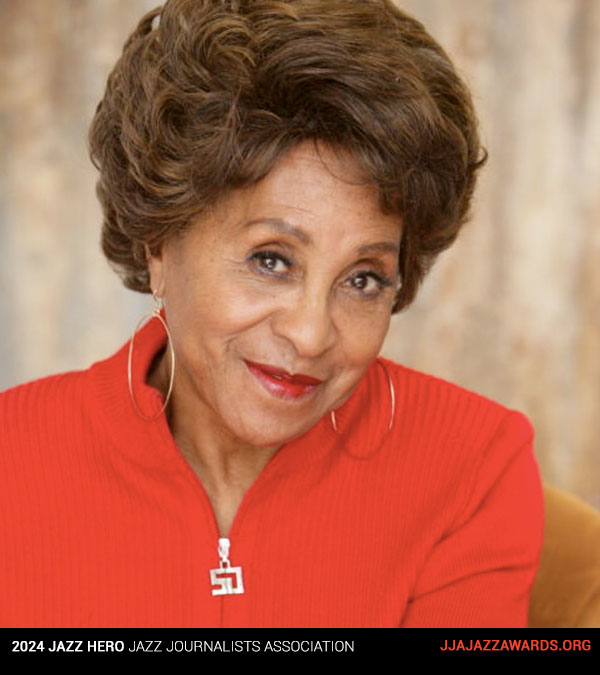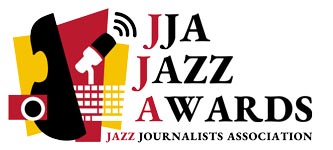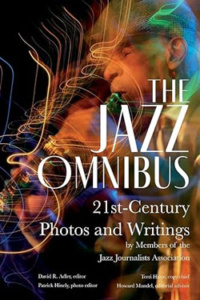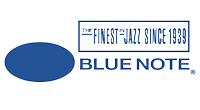Los Angeles Jazz Hero

Since the early 1970s, Marla Gibbs has been a force participating in and supporting the varied arts in Los Angeles’s African-American community. From the time she won the role of the maid Florence Johnson on the hit CBS TV show The Jeffersons (in 1975), she has committed serious financial resources to the Union of God’s Musicians and Artists Ascension (UGMAA), the umbrella organization of pianist-composer Horace Tapscott and the Pan Afrikan Peoples Arkestra, which continues as a significant cultural force to this day.
Born in Chicago and raised from mid-teenage in Detroit, Ms. Gibbs moved with her three children to Los Angeles in 1969. While working at United Airlines she became involved in the Watts Renaissance and pursued acting at the Performing Arts Society of Los Angeles (PASLA) and the Mafundi Institute. She has never stopped — now in her mid ‘90s, she continues acting in video and film. She is not a woman to rest on her laurels, or retire to chill.
In 1974, Marla Gibbs heard the Pan Afrikan Peoples Arkestra, met Tapscott and quickly identified with the esthetic and ethos he promulgated of enhancing their local community through the arts. She responded immediately by joining the Arkestra as a singer and soon became the driving force behind efforts to institutionalize UGMAA, providing an organizational focus and bringing in supporters skilled in establishing its legal basis and non-profit status.
Her success on The Jeffersons — attended by multiple Emmy and Golden Globe nominations — and her continued work at United, allowed her to purchase a home for the Arkestra, UGMAA and the related Crossroads Arts Academy, which she and her daughter Angela created and ran. The three-story building, known as “The Shop” after the printing business on its first floor, also housed a rehearsal, performance theater and attached recording studio. The second floor contained a classroom, office and living spaces. The third floor was used as a theater’ Marla produced works there, including trial runs of her NBC television series 227, which she starred in as a gossipy housewife.
By the early 1980s, UGMAA programming had lapsed and earthquake repair challenges forced Gibbs to leave The Shop. She relocated and continued Crossroads as a component of the large Inner City Cultural Center, and then bought Memory Lane, a long-standing jazz club near Leimert Park. She renamed it “Marla’s Memory Lane Jazz and Supper Club,” with a Tapscott ensemble as the opening and frequently featured band. She offered some of the finest jazz in Los Angeles there until 1999.
Marla continued looking for a more permanent home for the Crossroads Arts Academy and in 1990 purchased Leimert Park’s 1,180-seat, 1930s-era Vision Theatre, plus a second building for classes, small performances and administrative offices. Events held there contributed to making Leimert Park the center of the African-American community arts movement that’s given rise to contemporary artists such as Kamasi Washington and Dwight Trible.
Despite these efforts coinciding with the Leimert Park renaissance in the wake of the Rodney King upheavals in 1992, lack of adequate outside financial support forced Marla to give up the buildings in 1997. Acquired by the City of Los Angeles, it has operated sporadically, but now set for restoration and reopening in 2025.
All the while, Marla Gibbs has remained a power in supporting community artists and arts organizations as well as helping to meet other social needs, such as the drug treatment programs she fundraised for starting in the ‘70s and continuing for years. At the helm of her Crossroads foundation, she is focused, organized and not hesitant to intervene and correct courses when necessary. She is especially supportive and motivating to those working in the same directions. When I interviewed her for my book The Dark Tree about Horace Tapscott and UGMAA, she was involved, thoughtful, direct and expansive. She also remained in control; some things she wouldn’t discuss and she had no qualms telling me so. Socially, she’s always engaging, charming, smiling, at ease in the Tapscott home.
Marla Gibbs exemplifies the artist who doesn’t merely give back but actually puts her success at the service of her community. Hail Marla Gibbs, Jazz Hero!
— Steven Isoardi
Author, The Dark Tree: Jazz and the Community Arts in Los Angeles















